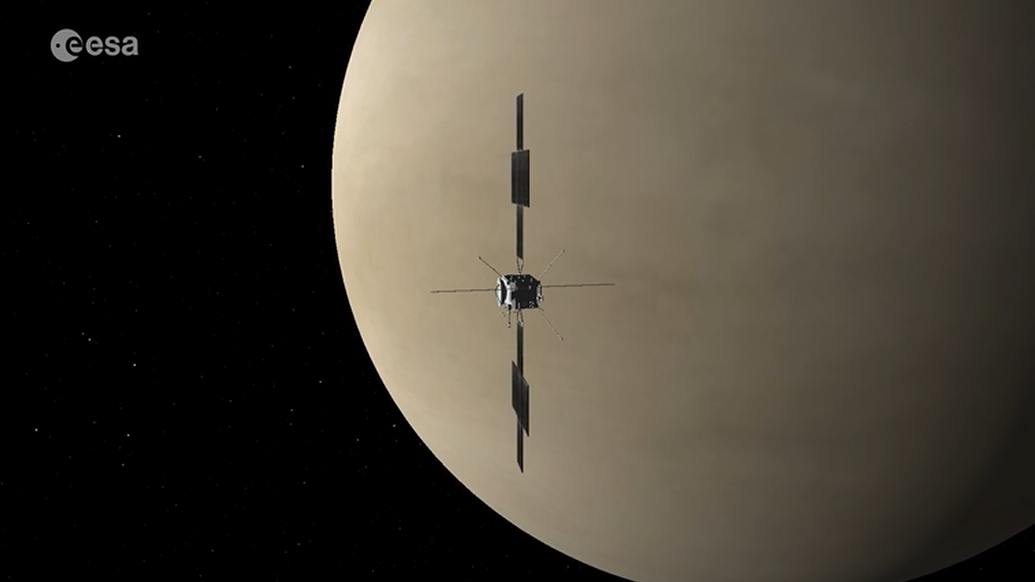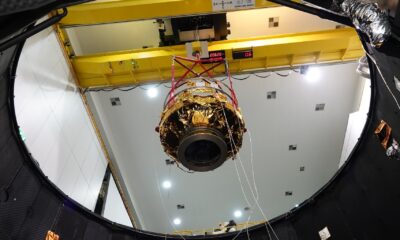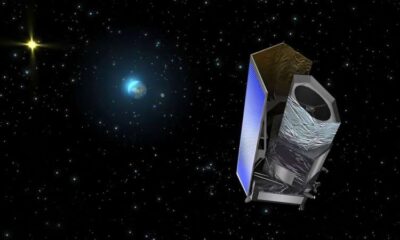Science
ESA’s JUICE Spacecraft Successfully Completes Venus Flyby

The European Space Agency’s (ESA) JUICE spacecraft completed a flyby of Venus early this morning, August 31, 2023, as part of its ambitious mission to explore Jupiter and its icy moons. This maneuver is crucial for JUICE, which stands for “Jupiter Icy Moons Explorer,” as it embarks on a journey to study the gas giant and its largest moons: Ganymede, Callisto, and Europa. These celestial bodies are significant in the search for extraterrestrial life due to their potential subsurface oceans.
JUICE’s flyby of Venus may seem counterintuitive, as it is headed toward Jupiter, but this trajectory is part of a carefully planned gravity-assist strategy. The spacecraft, weighing nearly 13,300 pounds (6,000 kilograms), utilized the gravitational pull of Venus to change its orbit around the sun and gain speed without expending fuel. This maneuver is essential for the spacecraft to effectively navigate the vast distance between Earth and Jupiter.
The flyby reached its closest point to Venus at 1:28 a.m. EST (0528 GMT). Unfortunately, JUICE’s sensors were turned off during this encounter due to the extreme heat of the planet’s atmosphere, meaning no images were captured. ESA noted that JUICE’s high-gain antenna served as a thermal shield during the flyby, emphasizing the challenges posed by Venus’s environment.
This maneuver follows a brief communication issue the JUICE team encountered in July when the spacecraft stopped transmitting data about its health and status. After approximately twenty hours of troubleshooting, mission operators successfully reestablished contact.
The next phase for JUICE involves another flyby of Earth, scheduled for 2026, which will allow the team to further refine its trajectory. According to ESA, “JUICE will use the gravity of Venus this week to bend its orbit around the sun and gain speed relative to Earth without using fuel.” Following this, the spacecraft will complete one more orbit around the sun before returning to Earth in January 2029.
After these crucial maneuvers, JUICE is expected to enter orbit around Jupiter in July 2031. This mission promises to enhance our understanding of the jovian system and its moons, which are believed to hold the keys to discovering life beyond Earth.
-

 Technology4 months ago
Technology4 months agoDiscover the Top 10 Calorie Counting Apps of 2025
-

 Health2 months ago
Health2 months agoBella Hadid Shares Health Update After Treatment for Lyme Disease
-

 Health3 months ago
Health3 months agoErin Bates Shares Recovery Update Following Sepsis Complications
-

 Technology3 weeks ago
Technology3 weeks agoDiscover 2025’s Top GPUs for Exceptional 4K Gaming Performance
-

 Technology2 months ago
Technology2 months agoElectric Moto Influencer Surronster Arrested in Tijuana
-

 Technology4 months ago
Technology4 months agoDiscover How to Reverse Image Search Using ChatGPT Effortlessly
-

 Technology4 months ago
Technology4 months agoMeta Initiates $60B AI Data Center Expansion, Starting in Ohio
-

 Technology4 months ago
Technology4 months agoRecovering a Suspended TikTok Account: A Step-by-Step Guide
-

 Health4 months ago
Health4 months agoTested: Rab Firewall Mountain Jacket Survives Harsh Conditions
-

 Lifestyle4 months ago
Lifestyle4 months agoBelton Family Reunites After Daughter Survives Hill Country Floods
-

 Technology3 months ago
Technology3 months agoUncovering the Top Five Most Challenging Motorcycles to Ride
-

 Technology4 weeks ago
Technology4 weeks agoDiscover the Best Wireless Earbuds for Every Lifestyle




















